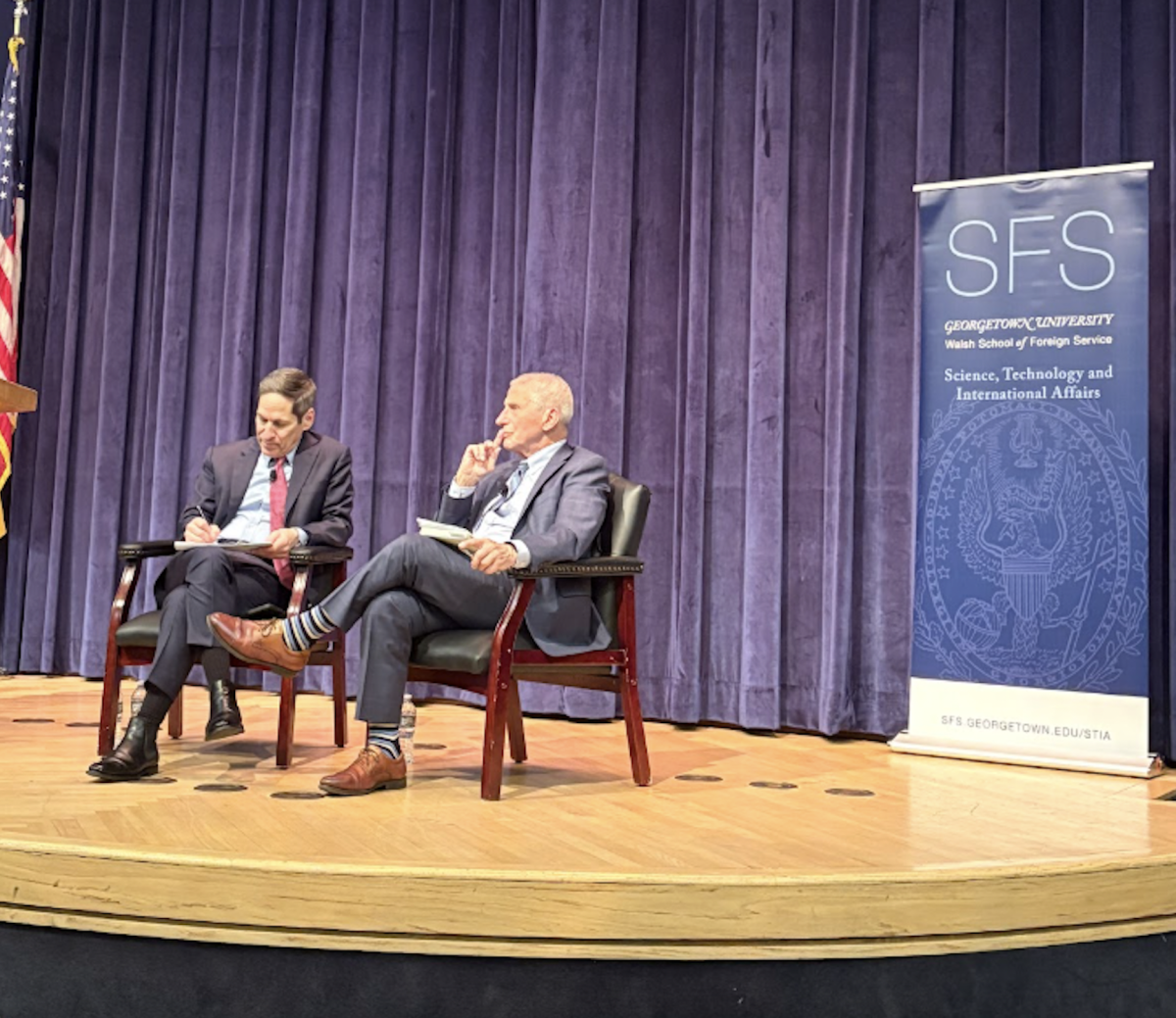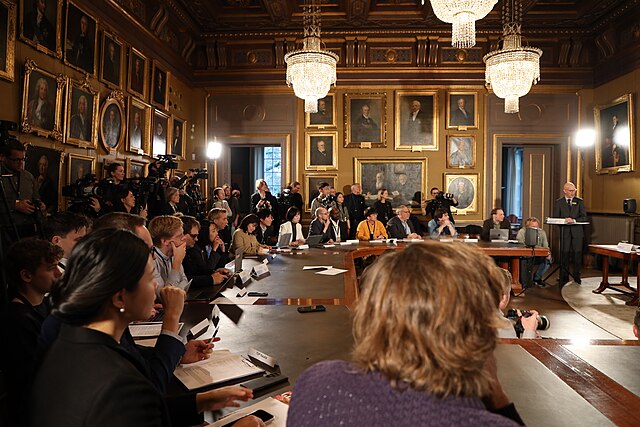Georgetown Entrepreneurship, a university-wide initiative supporting students in business development, hosted two technology journalists who advocated for accountability in the tech media landscape and encouraged journalists to approach their careers with an entrepreneurial mindset for a fireside chat Feb. 21.
Kara Swisher (SFS ’84), who is the co-founder and editor-at-large of the news website Recode and co-host of the Pivot podcast, and Eric Newcomer, who founded the media outlet Newcomer, were the two technology journalists present, with Devon Pasieka (MSB ’25) and Drew Peterson (MSB ’25) moderating the conversation. The event, titled “Navigating the Techscape,” was part of Georgetown Entrepreneurship’s Venture in the Capital Summit, an annual conference that gathers students, alumni and industry leaders to discuss topics in venture capital, entrepreneurship and public policy.
Newcomer said the lack of transparency from tech executives like Elon Musk troubles him.
“The core thing that disturbs me the most, as a journalist, is the professed transparency,” Newcomer said at the event. “When we dig into what Elon is actually disclosing, it’s very sloppy.”
Swisher said she dislikes tech executives’ influence on the federal government because of their pontification in non-tech sectors, despite possessing little expertise.
“This is a group of people who don’t want any guardrails of any sort, who don’t want any kind of anyone telling them what to do,” Swisher said at the event. “And the worst part now, unfortunately, is they think they know the best about every single thing, whether it’s Ukraine, whether it’s healthcare.”
Swisher referenced the Feb. 13 firing of 350 employees at the National Nuclear Security Administration (NNSA), an organization that maintains, refurbishes and guards the United States’ supply of nuclear warheads, by the Musk-led Department of Government Efficiency (DOGE). Some of the fired NNSA employees worked at nuclear weapon-building sites, oversaw contractors who built nuclear weapons and were responsible for inspecting the safety of nuclear weapons.
Newcomer said the current political environment can prove tricky to navigate and commented on the increasing lack of objectivity in journalism.
“I think the worst thing journalists can do is write these objective stories where it’s clear what side they’re on,” Newcomer said. “I want to be writing for the most part about business and the functioning of venture capital, and then only sometimes provide a moral voice for the industry when it feels like I have to.”
Shifting from the discussion of the media landscape, Swisher and Newcomer delved into their respective careers, focusing on factors that contributed to their success.
Newcomer said he decided to become an independent journalist after realizing he could bring a unique perspective to the industry.
“I saw that I was driving economic value at Bloomberg, the scoops that I had, I was like these make sense,” Newcomer said. “I see why somebody would pay for these, and so I went independent.”
Swisher said leveraging multiple media platforms helps her build strong relationships with her audience.
“You have to build a multifaceted relationship with your audience, whether it’s live events, newsletters, podcasts, and you have to treat them not like you’re talking down to them,” Swisher said.
Peterson said the summit allowed him to connect with like-minded people in entrepreneurship.
“Personally, this event has allowed me to find a lesser-known network of Hoyas pushing the bounds in Silicon Valley, technology, defense-tech, and food and beverage,” Peterson wrote to The Hoya. “The individuals within it have become some of my closest friends, colleagues and mentors.”
Pasieka said the fireside chat was a masterclass on the power of independent media.
“Watching Kara and Eric articulate how they’ve built their personal brands truly redefined my view on influence in today’s media landscape,” Pasieka wrote to The Hoya. “Their insights underscored that in an era where traditional mass media is constantly evolving, authenticity and individual voice aren’t just valuable — they’re revolutionary.”
Peterson said he hopes events like these encourage students to continue blazing their own paths in entrepreneurship, referencing the success of Georgetown graduates such as Guardian RF, a startup that develops advanced radio frequency spectrum sensors to detect, analyze and respond to threats.
“The true measure of this event’s success is seeing Georgetown students build and succeed as entrepreneurs following their passions,” Peterson wrote. “In recent years the Hilltop’s entrepreneurial ethos has changed — in the last two years three Georgetown students have been accepted into Y Combinator, and several others have raised considerable venture-backed funding.”
Swisher said students should embrace taking risks in their future careers, and that this often entails getting out of their comfort zones.
“I think a lot of people are very nervous to get out of the line; they want to go to a safe place,” Swisher said. “To me, don’t go to a safe space.”






